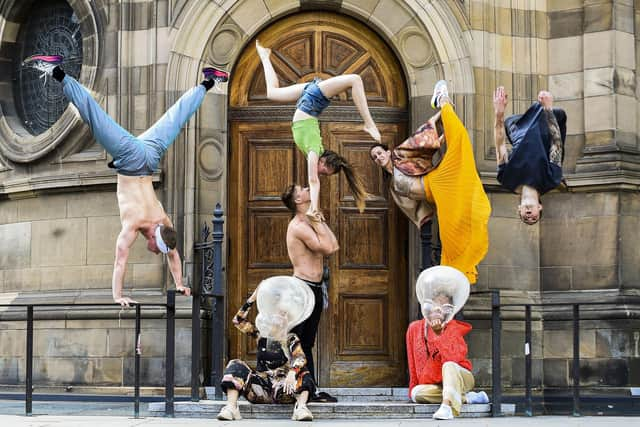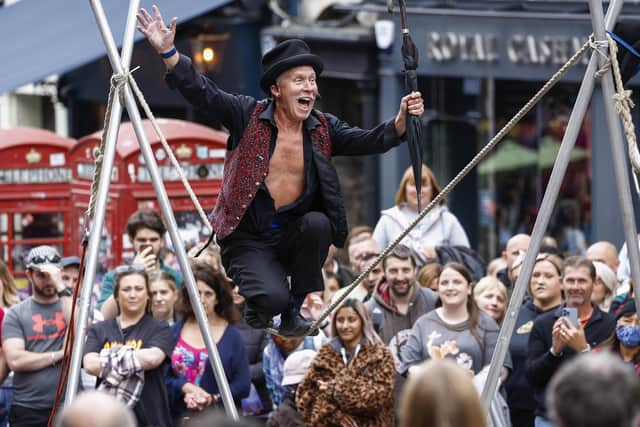Edinburgh’s festivals demand funding rethink as economic impact of recovery is revealed
A major rethink of financial support for Edinburgh’s biggest festivals is being urged after new research found that they are now worth nearly £500 million each year for the economy of the Scottish capital.
The new independent analysis, which includes spending on the festivals from local residents for the first time, found that the city’s main culture events now support more than 7000 jobs in the city.
Advertisement
Hide AdAdvertisement
Hide AdThe Scottish Government and the other public funders of the festivals are being urged to ensure they are not “taken for granted” after they attracted an overall audience of 3.2 million when they returned in full for the first time since the Covid pandemic last year.


The festivals are said to have contributed £492m to the Edinburgh economy and £620m to the Scottish economy, supporting a total of 8500 jobs, during 2022.
However Festivals Edinburgh, the organisation formed by the city’s signature events in 2007 to help ensure their long-term future and fend off global competition, has called on their backers to “realign ambitions” and resources to reverse a long-term decline in investment which is said to have left them “damaged.”
Although the overall tally is in line with the most recent FIFA World Cup football tournament, festival chiefs are warning that the city’s flagship arts events are “hanging by a precarious financial thread” due to a shortfall in public funding going back 15 years.
Festivals Edinburgh director Julia Amour said the city’s events were delivering a return on investment from the public purse around 10 times bigger than the Commonwealth Games in Glasgow.


More than 22,000 people were surveyed during the research by BOP Consulting, which found that 3.2 million attendees were recorded across the 11 biggest festivals in 2022, with around 1.5 million drawn from Edinburgh and across Scotland.
An estimated 700,000 people bought festival tickets last year, with the average festivalgoer attending more than four events.
Advertisement
Hide AdAdvertisement
Hide AdTheir average daily expenditure at the city’s festivals last year was £86. More than half of spending linked to the festivals went on accommodation, with food and drink responsible for around a quarter.
The new research is the first major analysis of Edinburgh’s festivals since the 2015 season, which attracted an overall audience of more than 4.5 million, around 1.3 million more than recorded last year. However the previous research, which valued the festivals at around £280 million for the city, did not factor in spending from its residents, who made up around 1.5 million of the 2022 audience.Festivals Edinburgh director Julia Amour said: “These findings all show how critical it is that the creative powerhouse of Edinburgh’s Festivals isn’t taken for granted.


“All those benefits are driven by the strength of our creative programmes, and the people behind them, who despite these successes are hanging by a precarious financial thread.
"This degree of fragility has happened despite the festivals having a massive local support base quantified here for the first time."
Public funding for the festivals has been pegged at around £11 million for the last decade. The city's book, art and film festivals have all scaled back elements of their programmes this year, with around 500 fewer Fringe shows confirmed than in 2019.
Ms Amour added: "Spending by festival audiences is supporting businesses and jobs more than ever, with hospitality and retail benefiting most – but the culture sectors and creative workers have only seen declining investment since the financial crisis.


"Objectives however have gradually been widening while grants have lost their value so festivals are now being expected to deliver 150 per cent of the benefits with 50 per cent of their previous purchasing power. There needs to be a serious effort between the culture sector and our funders and supporters to realign ambitions and resources.”
Advertisement
Hide AdAdvertisement
Hide AdScience festival director Simon Gage, chair of Festivals Edinburgh, said: “The positive impact our festivals have on businesses, jobs and livelihoods is great news for the people of our city and country - and we need to ensure that this economic recovery is built on a solid foundation of good responsible growth, looking after our people, our place and our planet.
“In this instance, our impact is primarily felt by the tourism and hospitality sectors, not by the festivals themselves and the people who make them happen – in fact, their unique cultural programmes are hanging each year by a precarious financial thread, damaged by Covid lockdowns and over 15 years of declining investment.
"We call on all funders and supporters to come together to consider their long-term role in helping the Edinburgh festivals remain Scotland’s world leading cultural brands and a crucial economic powerhouse.”
Culture Secretary Angus Robertson said: “Throughout the pandemic, the Scottish Government provided £256 million of additional support for the culture sector, with approximately £14.1 million for festivals since the start of the pandemic and an addition £2.1 million for the EIF, Fringe and film festival in 2022 for their 75th anniversaries.
“We recognise the impact of the pandemic and cost of living crisis, and we are currently reviewing the national events strategy with VisitScotland and the sector to ensure Scotland continues to be the perfect stage for events.”
Fringe Society chief executive Shona McCarthy said: “'The economic study announcement highlights the financial benefits that Edinburgh's festivals drive for not just the city, but across the whole of Scotland.
"It has never been more important to recognise the contribution of the thousands of artists who take the risk to come to Edinburgh every year.
Advertisement
Hide AdAdvertisement
Hide Ad"As an annual event which is reliant on self-generating funding across partnerships and sponsors every year, now is the time for our public funders and agencies to come together to support those at the very heart of our iconic festival - our artists - who contribute to both the cultural and economic success of Edinburgh.”
Dana MacLeod, executive director of arts at Creative Scotland, said: “The impact and influence of Edinburgh’s festivals cannot be underestimated. They attract artists and audiences from around the world, provide a platform for cultural discovery, and underline Edinburgh and Scotland’s reputation as a creative place.
“They make a significant contribution to our local and national economy, supporting businesses and creating jobs across many sectors.
“By bringing together artists and audiences from near and far, they encourage new ideas to flourish and connect the people and communities of Scotland to the world.”
Val Walker, culture convener at the city council, said: “This year’s study makes for fascinating and reassuring reading that the festivals continue to contribute greatly to the fabric of our city.
“We continue to be incredibly proud to be known as the world’s ‘Festival City’ and of course recognise the extremely positive contribution our festivals make to our lives, celebrating Edinburgh and bringing some of the world’s exceptional art and artists in a way no other city in the world enjoys.
“Edinburgh’s festivals are a unique cultural phenomenon and contribute year-round to our reputation as a destination city and help to showcase our identity as a welcoming place to be, both for those of us lucky enough to live here and the millions who have visited - and hopefully will visit.
Advertisement
Hide AdAdvertisement
Hide Ad"We want to continue to host inclusive high-quality and sustainable festivals and allow the benefits to be shared across our city.
“We will continue to work with the Festivals to ensure their jobs meet Fair Work standards, they are contributing towards our net zero 2030 target, and that they are supporting local independent businesses through their supply chains.”
Comments
Want to join the conversation? Please or to comment on this article.
